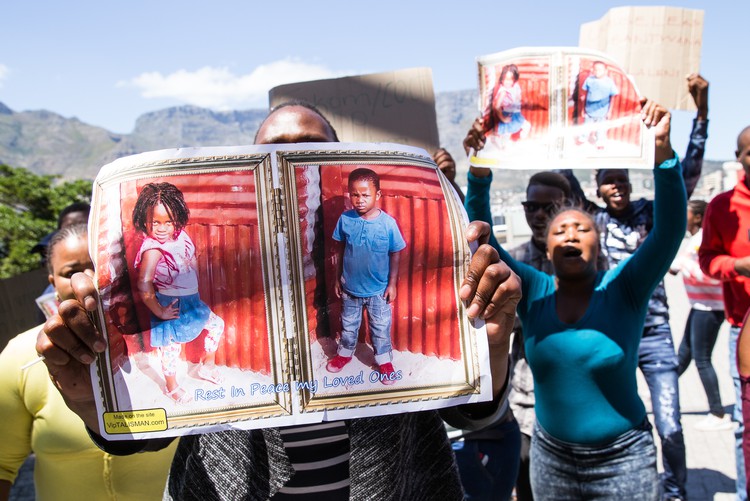Call to fix street lights after children electrocuted
Fears that other children might die from stray wires
Philippi East residents picketed outside the civic centre on Tuesday, calling on the City of Cape Town to fix street lights following the electrocution of two children last month.
They also called for details of the investigation into the tragedy.
Lindani Madolo, 6, and her brother Luniko, 5, were electrocuted by stray wires from a street light in the Thabo Mbeki informal settlement in Philippi East on 1 November.
Their mother, Viwe Madolo, was among the picketers.
Luniko wanted to be a taxi driver, she told GroundUp. “He was a boy full of fun and he liked to play.”
Six-year-old Lindani was the one who would tell her mother when the other children caused trouble, Viwe Madolo said.
About 50 community members and supporters of the Social Justice Coalition (SJC) came out in support of the family carrying pictures of the children and placards reading “Safer electricity in our community”.
Madolo said that she had had no communication with the City of Cape Town. “They did nothing at all” she says. The only support that she is receiving is from the community.
Community leader Buzwe Kali said residents were afraid other children could die. “We are in Christmas. The area is busy,” he said.
Mayoral Committee Member for Area South, Councillor Eddie Andrews, said Electricity Department staff had inspected the pole and stray wire. The damage was consistent with damage done by “vandals to facilitate an illegal electricity connection” he said. He said copper wire was missing, which “can only be attributed to copper theft which is rife in the area”.
The incident was being investigated by the Department of Labour and the City was also assigning an “independent professional expert”, Andrews said.
The picketers’ memorandum was handed to Phumlani Godlo from the mayor’s office.
Support independent journalism
Donate using Payfast

Don't miss out on the latest news
We respect your privacy, and promise we won't spam you.
Next: South Africa’s HIV treatment programme: a phoenix rising from the ashes?
Previous: Singing for circumcision
© 2017 GroundUp. 
This article is licensed under a Creative Commons Attribution-NoDerivatives 4.0 International License.
You may republish this article, so long as you credit the authors and GroundUp, and do not change the text. Please include a link back to the original article.

